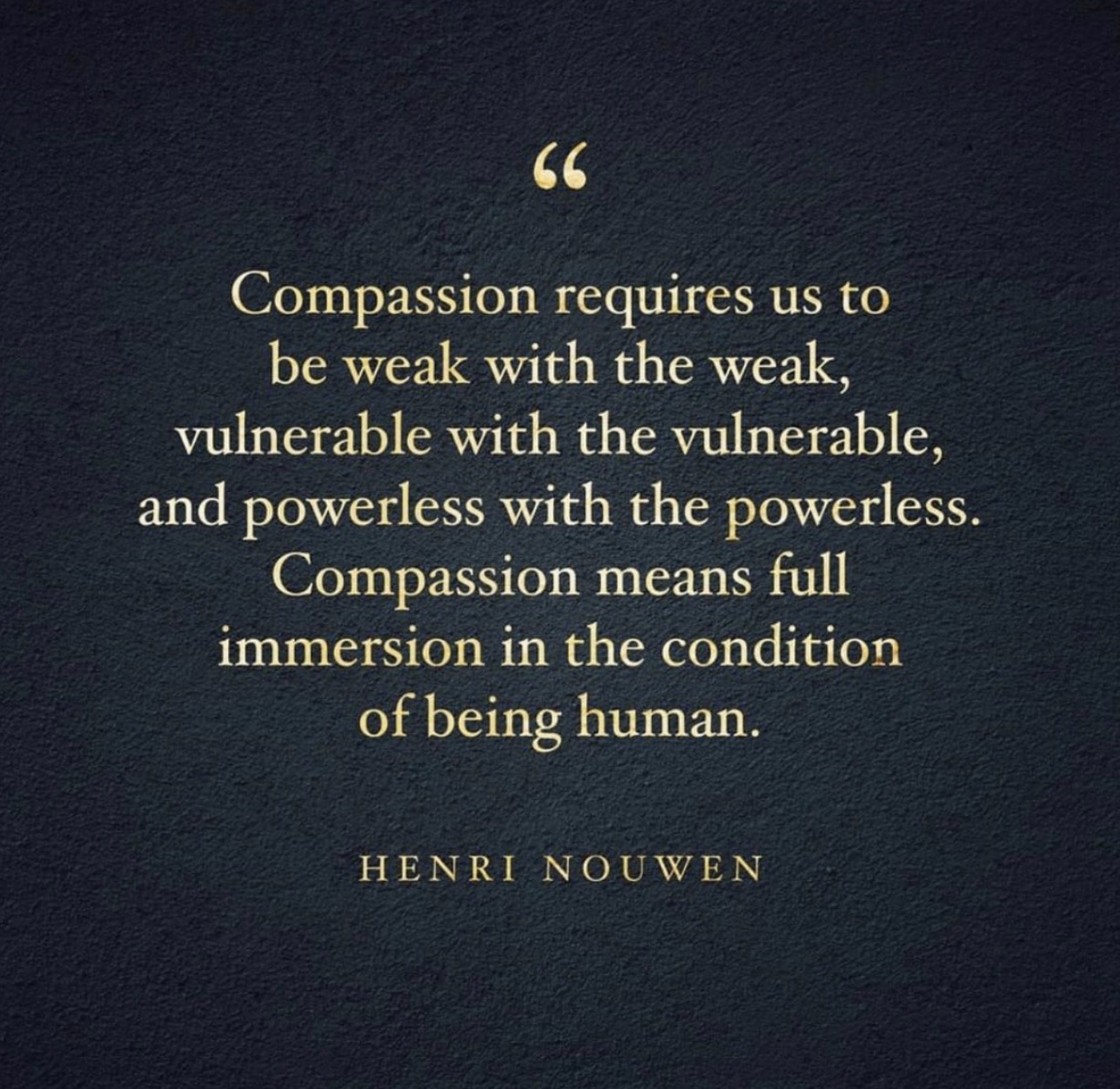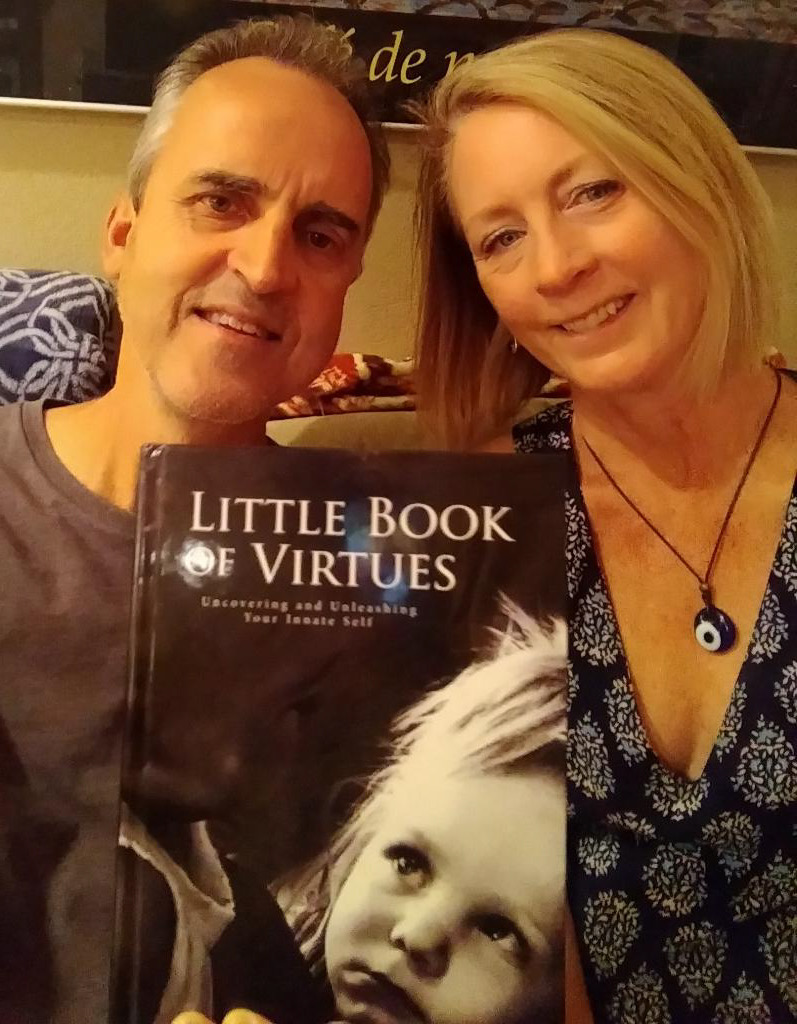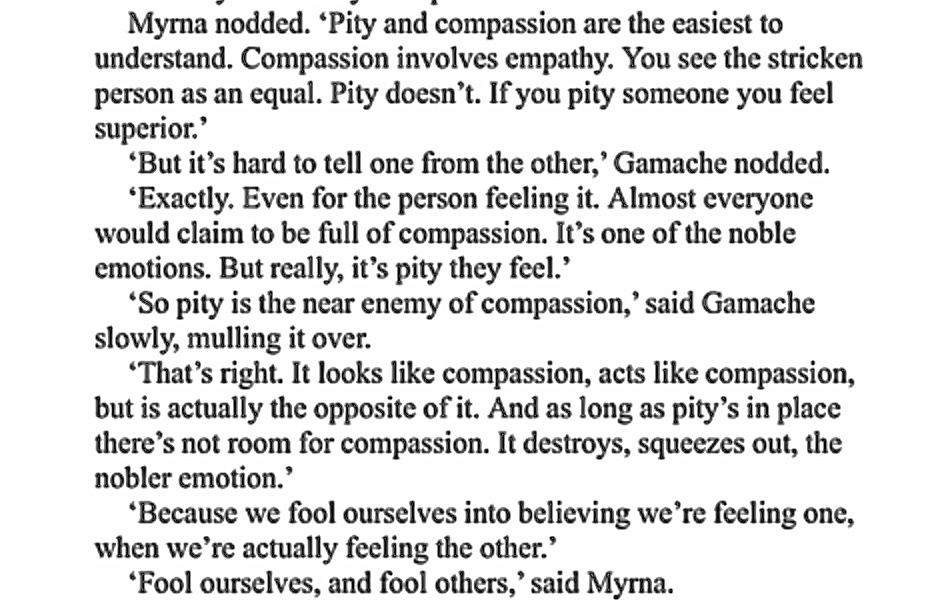COMPASSION
If you want others to be happy, practice compassion. If you want to be happy, practice compassion.
Real compassion means real action, feet on the ground, our lives interrupted in order to serve others.
Submit your personal story or favorite illustration, quote, Bible verse, etc. that illustrates a specific virtue to [email protected], then click on the virtue of your choice on the Virtues page to see your story or the stories and illustrations of others.

October 2, 2021
Activist and author Rev. angel Kyodo williams was raised in a Christian home, but ultimately found her calling as a Zen Buddhist priest engaged in the pursuit of radical justice. She writes:
Compassion seems like a nice buzzword, and we all want to have it. But compassion isn’t an idea that can be taught. You can’t pick it up at the bookstore. Compassion has to be felt. It’s one of those things that reveals itself without your having realized that it was at your disposal all along. You can’t manufacture what was always there, but you can create the condition in which it is most likely to thrive.
Art Nicklaus:
I would like to add that I believe this amazing insight applies to all of the virtues! We all want to have them, but they can’t be taught, they have to be felt. The virtues “are at our disposal all along.” They are part of our innate being. The best we can do is to “create the condition in which (the virtues) are most likely to thrive.” Thus the contemplation and action sections for each of the fifty-two virtues in Little Book of Virtues.

Carolyn Freeman with her husband Jon
September 5, 2021
My friend Carolyn Freeman who works in healthcare writes:
“I experienced working through the virtue of Compassion this morning. It was a deeply meaningful time as I thought about the compassion I’ve experienced from friends and family as I’ve walked the caregiving path and the path of mourning the loss of my parents. The ‘suffering with’ I felt in words of love and, in some cases, empathy, soothed my broken heart and allowed me to feel seen and heard. There was nothing for people ‘to do,’ but just ‘to be’ with me gave me so much strength.”
“Working though my thoughts on Compassion also reminds me that I have had to learn compassion for myself. To learn to ‘suffer with’ the wounded child within rather than critically judging her for her faults and shortcomings. This has been a difficult journey for me, and possibly for many of us. I think learning to offer compassion to myself has been crucial in me being able to offer compassion to others, to sit with them in their suffering with love and without judgment, or wanting to rescue.”
“I think compassion, this suffering with someone, can and does move our hearts to action. Maybe it’s reaching out with words. Maybe it’s reaching out with other forms of support. For me, I have to ask myself the ‘why’ to my action. Am I acting out of my own need to feel good about myself, or am I truly being moved by the Spirit to act without expecting anything in return? Even an acknowledgment? Or can I simply serve another with unconditional love?”
August 24, 2021
My friend Julie Bradley submitted the following:
the Pali word karuna is used to signify compassion; it means “the quivering of the heart in response to (another’s) suffering.”
January 17, 2022
My friend Rose Brooks sent me the following excerpt from a book she was reading called “The Cruellest Month” by Louise Penney:

April 20, 2022
Consider Everyone Your Mother, from Danielle Shroyer on beasoulninja.com
It is a beautiful Tibetan tradition to consider all sentient beings your mother. Doing so brings out a warmth in us, a sense of belonging and responsibility. And why wouldn’t we want to take care of our mothers? Of course we would. If we saw any of our mothers suffering, we would be moved to change or help the situation.
This move to action is precisely the point. An awakening mind moves beyond the idea of compassion to the work of compassion. As Ken McLeod writes, “In your heart is a longing, a yearning, to help all beings find a way to live in which they are not struggling with their lives.” And what’s the point of that longing if it does not translate into action?
Accordingly, Verse 9 spoke about liberation in individual terms, in our inner world. It’s about getting free of the rat race. But Verse 10 now speaks about liberation in collective terms: it’s about creating a world where there is no rat race. This is inherently political. It means supporting laws and initiatives on local, state, and national levels that actually support systems of justice. It means creating a more just world where not so many people struggle in their lives. Certainly that requires personal acts of kindness, but at some point it asks us to see society as a whole, too.
As Dilgo Khyentso says, “It would be heartless to practice the Dharma for your own liberation, ignoring the bondage of others.” Let’s instead use our energies to move the world toward wholeness and goodness. And if that feels daunting to do, or you don’t know where to begin: consider everyone your mother. Let the longing for compassion arise in you and clear your mind. And then find the next right step.
June 8, 2021
This story of “The Man on the Train” by Stephen Covey from his book “The Seven Habits of Highly Effective People” impacted me forever when I read it years ago. In order to really “feel” compassion, we must be enlightened with revelation and understanding of people and their situation which cries out for compassion; we need a “paradigm shift”:
“I remember a mini-paradigm shift I experienced one Sunday morning on a subway in New York. People were sitting quietly – some reading newspapers, some lost in thought, some resting with their eyes closed. It was a calm, peaceful scene.
Then suddenly, a man and his children entered the subway car. The children were so loud and rambunctious that instantly the whole climate changed.
The man sat down next to me and closed his eyes, apparently oblivious to the situation. The children were yelling back and forth, throwing things, even grabbing people’s papers. It was very disturbing. And yet, the man sitting next to me did nothing.
It was difficult not to feel irritated. I could not believe that he could be so insensitive as to let his children run wild like that and do nothing about it, taking no responsibility at all. It was easy to see that everyone else on the subway felt irritated, too. So finally, with what I felt like was unusual patience and restraint, I turned to him and said, “Sir, your children are really disturbing a lot of people. I wonder if you couldn’t control them a little more?”
The man lifted his gaze as if to come to a consciousness of the situation for the first time and said softly, “Oh, you’re right. I guess I should do something about it. We just came from the hospital where their mother died about an hour ago. I don’t know what to think, and I guess they don’t know how to handle it either.”
Can you imagine what I felt at that moment? My paradigm shifted. Suddenly I saw things differently, and because I saw differently, I thought differently, I felt differently, I behaved differently. My irritation vanished. I didn’t have to worry about controlling my attitude or my behavior; my heart was filled with the man’s pain. Feelings of sympathy and compassion flowed freely. “Your wife just died? Oh I’m so sorry! Can you tell me about it? What can I do to help?” Everything changed in an instant.”
May 19, 2021
Empathy, by Tamara Levitt
The more compassionate we are with ourselves, the better we become at offering empathy to others.
So what does it mean exactly, to be empathic? The definition of empathy is “the ability to understand and share the feelings of another.” So it’s different from sympathy, which can feel judgmental, and doesn’t always feel supportive. When we offer sympathy, we are saying in a sense, “poor you.” Empathy involves connecting with something in ourselves, that helps us relate to someone else’s experience.
It allows people to feel understood and supported, even if our circumstance is different. Empathy involves letting people know they aren’t alone. We aren’t trying to fix them or offer advice. It’s being with someone and feeling with someone. Brene’ Brown has shared some astute words about empathy. She said, “One of the things we sometimes do in the face of very difficult situations, we try to make things better. If I share something with you that is difficult, I’d rather you say, ‘I don’t know what to say; I’m just really glad you told me.’ Because the truth is, rarely can a response make something better. What makes something better is connection.”
So the next time you want to offer empathy to someone in your life, remember this. And rather than offering pity, and trying to fix them, focus on feeling with them, and creating connection.
Empathy is not saying “It’s OK” when it’s not. Empathy is being there with someone when it’s not OK.
(Tamara shares a story of a time a friend lost her husband to cancer. Her friend told her that the plethora of sympathy cards and macaroni casseroles did not help a whole lot. Tamara decided she would just be present for her friend. So every few days for a couple of months, Tamara would come by for a couple of hours. She would make tea, and sometimes they would laugh and share memories. Sometimes her friend would cry, and sometimes Tamara would cry with her. Sometimes they would just sit in silence. Years later the friend told Tamara how much her presence helped her get through the grieving and loneliness.)
